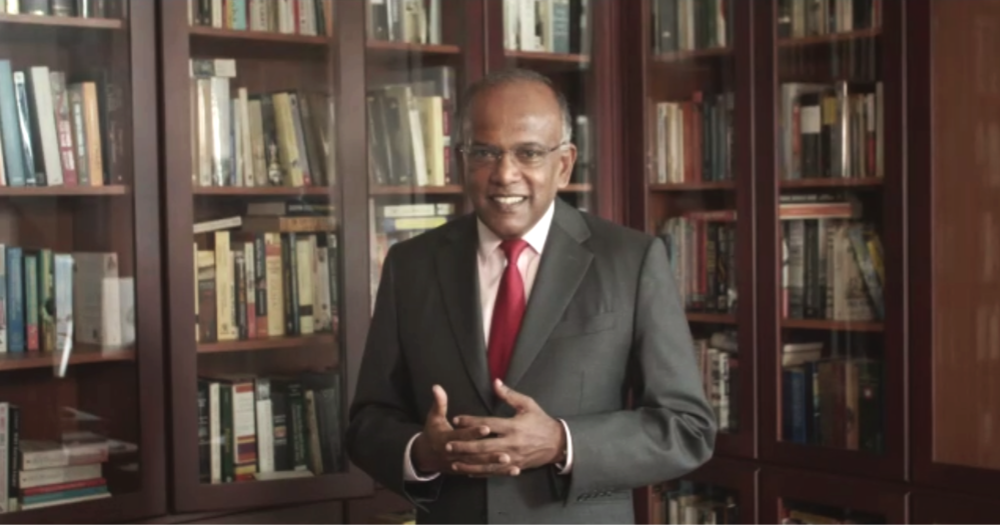Home Affairs and Law Minister K Shanmugam said that the government will work with Singaporeans to undertake a comprehensive review of issues relating to women, culminating in a white paper that will lay out a women development roadmap.
In a wide-ranging speech on Women and Gender Equality at the virtual dialogue session via Zoom (Sep. 20), Shanmugam told the over 100 participants from youth groups and women organisations that the government will co-organise a series of “Conversations on Women Development” to obtain recommendations from the public.
After the sessions, participants' views will be consolidated, and will form the basis of a White Paper that is expected to be delivered in the first half of 2021.
Shanmugam said,
"The outcome of this process is not just a White Paper, with recommendations. But (the outcome) has got to be a clear message to every young girl today, and in the future, that Singapore will always be a place where they can achieve their fullest potential, fulfil their hopes and fulfil their dreams."
Scope of review
Shanmugam outlined the areas that will be reviewed, emphasising that one key area would be the question of how to bring about a fundamental mindset change from a young age.
This change, Shanmugam said, would involve Singapore "accepting equality" as its starting point, from which differential treatment would have to be justified, instead of seeing what can be done to correct differential treatment of women.
The review would also examine women development in specific contexts of the home, at schools and workplaces, and in the community.
In the home, Shanmugam highlighted the need to protect women from family violence and intimate partner violence.
He also spoke about recognising "the integral roles played by women at home as wives, mothers, caregivers, (and) homemakers"
At schools and workplaces, Shanmugam said that the review would cover "the way women are thought about" in those contexts, how to protect them from sexual harassment, assault, and workplace discrimination, as well as ensuring equality of opportunities between men and women.
In the context of the community, topics up for review would include pushing back against gender stereotypes, and looking at the issues vulnerable members in society face.
Need for mindset shift, not just increased penalties
Shanmugam explained that the background to these sessions being carried out was a series of voyeurism cases in local universities, as well as the case of a dentistry student who strangled his ex-girlfriend, which was before the courts earlier this year.
The discussion on these cases centred around the appropriate penalties and mitigating factors in such cases, Shanmugam said.
He had previously announced that a review would be conducted.
However, Shanmugam said that the discussions on the cases also raised the question of whether "a more philosophical, fundamental way of approaching this to deal with the problem" was possible, beyond just increasing penalties.
Emphasising the need for a change of mindsets, Shanmugam said that attitudes held toward gender "starts from a very young age" and said that "gender equality and gender respect" should be held as a "fundamental value".
He also said that a related issue to be looked at was structural issues that affect women's ability to achieve their full potential.
Reflecting on the journey so far
Shanmugam also spoke about how the government has taken steps toward greater gender equality over the years.
He pointed to the following milestones:
- The Women’s Charter, passed in 1961 and amended over the years, providing for equal rights in areas such as property, rules for divorce, as well as strengthened laws on offences against women and girls.
- A legal framework to protect women's interests, including amendments to the law to reduce trauma for victims participating in the criminal justice process, to create new offences for technology-facilitated sexual crime and to protect minors from sexual predators, to repeal marital immunity from rape, and to allow victims to obtain protection orders against stalking, online bullying, and intimate partner violence.
- A Family Violence Taskforce, started in 2020 to combat family violence and protect victims — recommendations from the Taskforce can be expected next year.
- A "sense of safety and security", for which Shanmugam cited a 2018 public perception survey in which 93 per cent of women said that they felt safe in Singapore, saying that "we have to ensure that our laws continue to protect this sense of safety and security".
He also spoke about the government's efforts to improve the equality of economic opportunities for women at work:
- The Council for Board Diversity, formed in 2014 to address under-representation of women in board positions.
- Promoting flexible work arrangements for working mothers so that they can balance work with family responsibilities.
- Improving infant care and childcare, in terms of accessibility and affordability so that mothers can remain in the workforce.
- Encouraging greater sharing of parental responsibilities by allowing fathers to take up to eight weeks of leave to care for children.
"We want women to be presented with real choices and unencumbered by unequal expectations between the roles of men and women in society," Shanmugam said.
He also outlined Singapore's achievements in terms of indices such as Singapore's 11th-place ranking for gender equality in the 2019 UN Human Development Report, among others.
Shanmugam acknowledged, however, that "what also matters is the lived reality of women in Singapore," and that "more can still be done".
We deliver more stories to you on LinkedIn
Top image screenshot from MSF Zoom session.
If you like what you read, follow us on Facebook, Instagram, Twitter and Telegram to get the latest updates.
